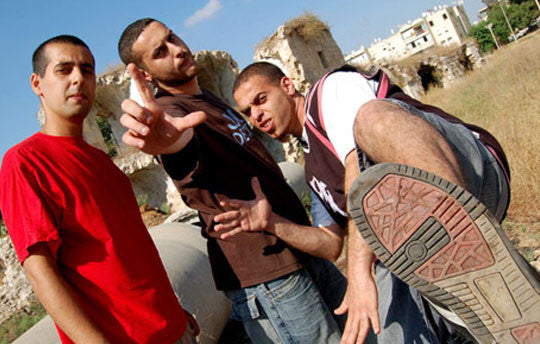Your Cart is Empty

DAM are the first Palestinian hip-hop crew, and among the first artists ever to rap in Arabic - the name standing for 'Da Arabian MCs'. The band consists of Suhell Nafar, Tamer Nafar, and Mahmoud Jreri, who began working together in the late 1990s, when they were struck by the uncanny resemblance of the reality of the streets in a Tupac video to the streets in their own neighborhood of Lyd, which is now in Israel.
Their 2001 hit 'Meen Ehrabi' ('Who's the Terrorist') was downloaded over a million times following its internet release. As Le Monde newspaper wrote DAM are the 'Spokesperson of a generation' - the lyrics to this song clearly resonated with the Palestinian (and wider) community, tackling the issues of hipocrasy, brutality and unfair media represenations that Palestinians face every day.
And then you call us terrorists. You've killed and looted
When I accused you, you jumped up and say :-
'You too let children throw stones
Don't they have parents to keep them at home?'
What, did you forget you buried the parents
under the stones of there own homes??
And now you call me a terrorist?
Clearly, DAM are recycling the idea of hip-hop as the music of the disposessed and dissenting youth to great effect in criticising the occupation - 'Meen Ehrabi' exudes anger and frustration, and they cite Tupac and Public Enemy as influences. Their new song 'If I Could Go Back in Time', written in cooperation with UN Women and featuring Amal Murkus, also turns inwards to give social and political messages that reverse the too-often-found hip-hop stereotype of women. The song tackles issues of domestic violence and crimes against women - a highly taboo issue. In the song, a woman resists her family's decision that she must marry her cousin, and is then shot by her brother. DAM point out the unfair reality, that in her family's eyes, her ultimate crime was to be born a woman:
Their expressions filled with anger as if someone announced a crime
“Congratulations, it’s a girl”
The beginning.
Using clever wordplay, however, they then reverse this by saying 'al huriyya untha' ('freedom is a woman'), pointing out the irony that in Arabic the word 'freedom' is feminine. At the end of the video, a blank screen coupled with the words 'There is no link between killing women and honor. Murder is a crime. Say no - unite to end violence against women', flashes up.
DAM also do a lot of work with children, wishing to help alleviate thir everyday suffering. Believing that hip-hop is a constructive, peaceful, and enjoyable way to express anger and emotion, the workshops are seen by both DAM and the communities they work in as immensely valuable.
'The US have made Israel their fifty-first state, clearing the middle east of its Indians, hitting us, then blaming us. But all the biggest armies in the world are weak against the hopes of children'. - DAM
For more information on hip-hop in Palestine, see Slingshot Hip Hop,a 2008 film directed by Jackie Reem Salloum, which braids together the stories of young Palestinians living in Gaza, the West Bank and inside Israel as they discover hip-hop and employ it as a tool to surmount divisions imposed by occupation and poverty.
Watch out for DAM's upcoming inclusion on a World Music Network Rough Guides album!